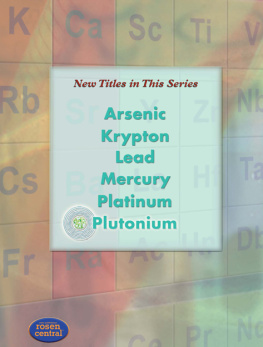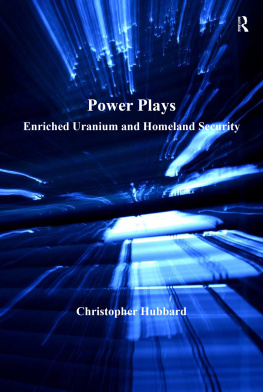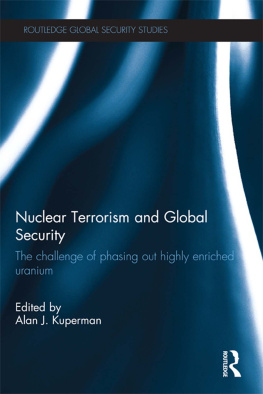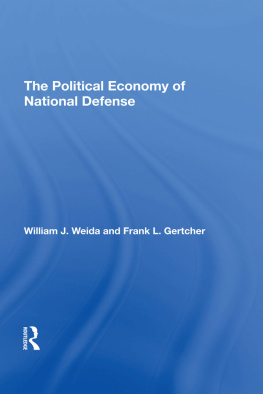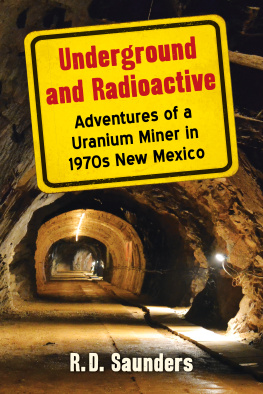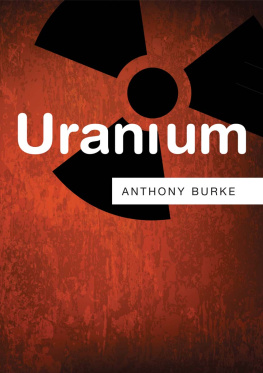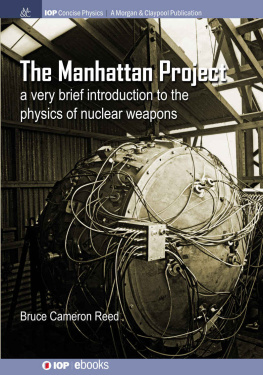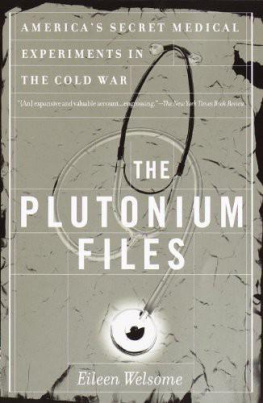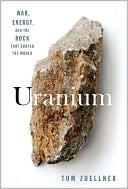REGAINING SECURITY - A GUIDE TO THE COSTS OF DISPOSING OF PLUTONIUM AND HIGHLY ENRICHED URANIUM
For Kierstan, Lanaya, Shelby and Rachel, my grandchildren whose future depends on a successful resolution of this problem.
First published 1997 by Ashgate Publishing
Reissued 2018 by Routledge
2 Park Square, Milton Park, Abingdon, Oxon, OX14 4RN
711 Third Avenue, New York, NY 10017, USA
Routledge is an imprint of the Taylor & Francis Group, an informa business
Copyright W. Weida 1997
All rights reserved. No part of this book may be reprinted or reproduced or utilised in any form or by any electronic, mechanical, or other means, now known or hereafter invented, including photocopying and recording, or in any information storage or retrieval system, without permission in writing from the publishers.
Notice:
Product or corporate names may be trademarks or registered trademarks, and are used only for identification and explanation without intent to infringe.
Publishers Note
The publisher has gone to great lengths to ensure the quality of this reprint but points out that some imperfections in the original copies may be apparent.
Disclaimer
The publisher has made every effort to trace copyright holders and welcomes correspondence from those they have been unable to contact.
A Library of Congress record exists under LC control number: 97072265
ISBN 13: 978-0-367-00015-8 (hbk)
ISBN 13: 978-0-367-00016-5 (pbk)
ISBN 13: 978-0-429-44499-9 (ebk)
This book represents the first publication in a Peace Economics Studies Series put out by Economists Allied for Arms Reductions (ECAAR). I would like to thank the members and board of ECAAR for their support and encouragement, and I would particularly like to acknowledge the help of Professor Walter Isard and the kindness shown me by Dr. Robert Schwartz, Professor Lawrence Klein, Professor Kenneth Arrow, and Professor James Tobin during the period of research that culminated in this book. Special thanks also goes to the W. Alton Jones Foundation, the Unitarian Universalist Veatch Foundation, the Threshold Foundation, The Rubin Foundation, the Ploughshares Foundation, the Deer Creek Foundation, the Town Creek Foundation, and the Compton Foundation, all of whom have supported my research in the disposition of nuclear materials. Finally, it is especially important to acknowledge both Ms. Alice Slater, whose organizing and managerial abilities made this project possible, and the hundreds of citizen activists at sites around the United States whose efforts to control the hazardous substances discussed in this book have been singularly important in averting the terrible problems these materials could have caused.
This book shows that costs of disposing of nuclear materials are most likely to be increased by subsidies to disposition programs, by increased volumes of waste from reprocessing, by increased handling of nuclear materials, and by technologically unproved methods of disposition. For economic reasons, plutonium is not a viable fuel for commercial reactors, and highly enriched uranium downblending faces the same unfavorable future as the nuclear power industry. Transmutation, which has high technological uncertainty and uses reprocessing is also not viable. This leaves only vitrification and a few surface or geological disposal methods as economically viable methods for disposition - the choice between them can be based on time, security and environmental concerns.
Because all aspects of decisions concerning disposition of nuclear materials are technically difficult, every effort has been made to explain the economics of disposition in a manner that is understandable to the informed lay person. To assist in making economic comparisons between disposition techniques, all costs in this book have been converted to 1996 dollars. In addition, the executive summary section that follows will act both as a general guide to the content of the chapters and as a preview of the major conclusions and findings of the book.
A complete glossary is included in the back of the book to assist the reader with the many specialized terms and acronyms used to describe nuclear issues, and a collection of costs for commonly discussed disposition options and factors likely to be the major cost drivers in disposition are both presented in the final chapters.
Economic issues and the disposition of weapon-grade plutonium and highly enriched uranium
Disposition involves dismantling weapons and warheads, intermediate disposition of nuclear materials, and long-term disposition of all surplus weapon-usable fissile materials.
There is currently no way to economically use plutonium as reactor fuel.
Plutonium of virtually any isotopic composition can be used to make nuclear weapons.
Over the next 10 years about 200 tons of plutonium and 1,000 tons of highly enriched uranium will be recovered from dismantled weapons.
There will be enough reactor-grade plutonium by 2010 to make about 71,000 primitive bombs
The economic value of plutonium and highly enriched uranium
Highly enriched uranium and plutonium are not uniquely valuable fuels for power reactors.
A fuel fabricator will pay for low enriched uranium instead of accepting free weapon-grade plutonium.
There is no viable market in weapon-grade plutonium - prices for plutonium and the amount of highly enriched uranium allowed on the market are set to achieve political, not economic ends.
Reprocessing is desirable only if there is a shortage of natural uranium at reasonable prices. Such a shortage is unlikely to ever occur.
Low enriched uranium costs about half the estimated cost of new plutonium (mixed oxide) fuel. Reactor burning adds about $1.7 billion to the costs to dispose of 200 tons of plutonium.
Plutonium becomes economically viable as reactor fuel only when uranium prices sharply increase. However, such a price rise would make all nuclear power plants unable to compete with competing sources of energy.
Disposition quantities of surplus materials
The pit or explosive center of a nuclear warhead contains about 34 kg of plutonium. The uranium secondary has about 15 kg of highly enriched uranium.
There are about 100 metric tons of weapon grade plutonium in both Russia and the US, with lesser amounts in Japan, Great Britain, and France.
There are about 2300 metric tons of highly enriched uranium worldwide, almost all of it in the former Soviet Union and the US.
By the year 2000, the total amount of separated plutonium in the civilian sector is expected to surpass the total amount in weapons arsenals.
The DOEs dismantlement goal of 2000 warheads per year has never been met.
The economic nature of the US commercial nuclear industry and the disposition of downblended highly enriched uranium as reactor fuel


